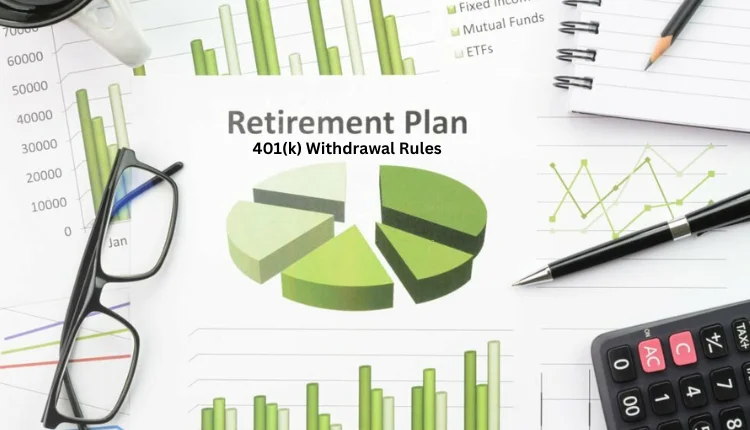Table of Contents
401(k) Withdrawal Rules
Discover the 401(k) Withdrawal Rules: everything you want to recognize. Get expert insights, FAQs, and a complete manual for dealing with your retirement price range.
In the latest ever-converting financial landscape, information on the 401(k) Withdrawal Rules is critical for securing your retirement. This comprehensive guide will take you through the whole lot you need to recognize about coping with your retirement finances efficaciously.
Retirement plans
Retirement plans may be a frightening venture, but they not should be. With the proper understanding and techniques, you could make the maximum of your 401(k) and secure a cushy retirement. In this text, we will delve deep into the 401(k) Withdrawal Rules and offer you expert insights and solutions to frequently asked questions.

Getting Started with Your 401(k)
Before we dive into the withdrawal policies, let us cover the basics of putting in and coping with your 401(k) account.
What Is a 401(k)?
A 401(k) is a duty-advantaged retirement monetary reserve funds plan presented through businesses to their workers. It licenses you to contribute a piece of your pre-charge compensation into a venture account.
Why Should You Invest in a 401(k)?
Putting resources into a 401(k) gives various benefits, which incorporate tax cuts and business undertaking commitments. It’s a smart method for developing your retirement reserve funds throughout the long term.
Setting Up Your 401(k)
To begin, counsel your HR branch and pursue your association’s 401(k) plan. You’ll have to conclude how many parcels to make a commitment to and select your speculation choices for Beagle Financial Services.
Understanding 401(k) Contribution Limits
Contributions to your 401(k) are difficult due to annual limits set by the IRS. It’s essential to be privy to these limits to maximize your savings.
Contribution Limits for 2023
For 2023, the annual contribution restriction for 401(k) debts is $20,500 for people under 50. If you’re 50 or older, you could make trap-up contributions of a further $6,500.
Employer Matching Contributions
Many employers provide matching contributions, which could considerably improve your retirement savings. Be positive to take full benefit of this benefit.
401(k) Withdrawal Rules: Everything You Need to Know
Now, let’s dive into the coronary heart of the matter – the guidelines governing 401(k) Withdrawal Rules.
Age 59½ Rule
The age 59½ rule stipulates that you could begin making penalty-loose withdrawals out of your 401(okay) after you reach this age. However, withdrawals are nonetheless a challenge to profits tax.
Early Withdrawals
If you want to get the right of entry to your 401(k) finances earlier than age 59½, you can achieve this however be organized to pay a 10% early withdrawal penalty further to earnings tax.
Required Minimum Distributions (RMDs)
Once you attain age 72, you ought to begin taking required minimum distributions (RMDs) out of your 401(k). Failing to achieve this can bring about tremendous penalties.
Roth 401(k) vs. Traditional 401(k) Withdrawal Rules
Understanding the variations among Roth and Traditional 401(k) Withdrawal Rules is vital for optimizing your tax strategy in retirement.

Wrapping-Up with 401(k) Withdrawal Rules
Navigating the 401(k) withdrawal guidelines may be complex, however, with the right knowledge and cautious planning, you can make certain a secure and comfortable retirement. Remember that your 401(k) is a valuable asset, and dealing with it wisely is prime to attaining your financial desires.
Frequently Asked Questions (FAQs)
Can I borrow from my 401(k)?
Yes, most 401(k) plans permit you to take out a mortgage from your account, but there are limits and issues.
What occurs to my 401(ok) if I alternate jobs?
You have several alternatives, consisting of rolling your 401(k) over into your new organization’s plan or a man or woman retirement account (IRA).
Can I withdraw cash from my 401(k) for a home purchase?
In some cases, you can use your 401(k) budget for a first-time domestic buy without penalties, but there are strict regulations and boundaries.
What is a hardship withdrawal?
Certain monetary hardships may additionally qualify you for a penalty-free withdrawal, but it is vital to fulfill unique criteria.
Are there exceptions to the early withdrawal penalty?
Yes, some exceptions, inclusive of disability or clinical expenses, may additionally allow you to avoid the ten% early withdrawal penalty.




